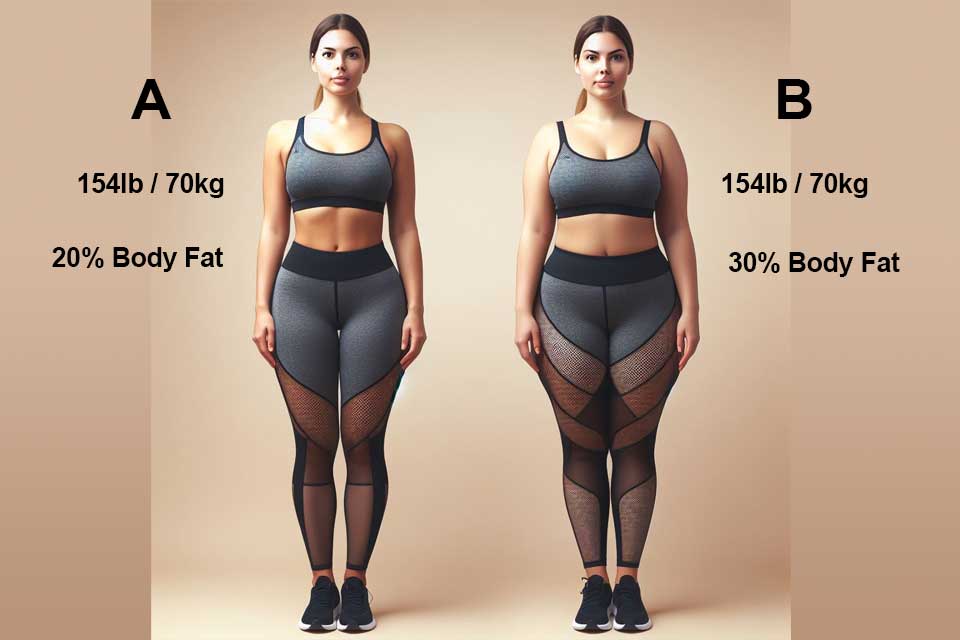What’s the difference between losing weight and losing fat?
In the simplest terms, weight loss is the reduction in overall body mass, which includes fat, muscle and water. On the other hand, fat loss specifically targets the reduction of excess fat from the body. When it comes to achieving a healthier body, understanding the difference between the two is crucial.
Weight loss vs fat loss – while these terms are often used interchangeably, they actually refer to quite distinct concepts with different implications for your overall health and well-being:
1. Weight Loss:
- Is all about a reduction in overall body weight – the number on your scales.
- Includes not only fat, but water weight and muscle mass.
- Weight loss is generally what you get when you crash diet or impose heavy calorie restrictions on your body.
- Weight loss can be rapid but is often unsustainable.
2. Fat Loss:
- The focus is on body composition, rather than the number on the scales.
- Specifically targets the reduction of body fat while preserving lean muscle mass. This is super important for overall health and fitness.
- Achieved by making lifestyle changes aimed at balanced nutrition and regular exercise..
- Not as rapid, but much more sustainable over the long term as you make changes that just become part of your life.
Why does it matter?
When you just want to drop some weight fast, there’s certainly many diets and programs that you can get on to and you’ll probably lose some weight.
So why does it matter what weight you lose?
1. It’s good to lose body fat: Excess body fat, especially around organs (visceral fat), is associated with various health risks such as heart disease, type 2 diabetes, and metabolic syndrome.
2. It’s bad to lose muscle mass: Losing muscle mass along with fat can lead to a decrease in metabolic rate and physical strength, making it easier to regain weight. Since muscle burns more calories at rest than fat does, you want to keep what you’ve got and even build on it.
3. That water weight will return: Initially, much of the weight lost during dieting is water weight rather than fat. When normal eating patterns resume, water weight is often regained – quickly. All that effort gone to waste… literally.
4. It’s all about sustainability: Many broad weight loss methods will result in rapid but unsustainable weight loss, which in turn leads to yo-yo dieting and weight regain over time. By focusing on fat loss through sustainable lifestyle changes, you’re more likely to maintain your progress in the long term and enjoy lasting health benefits.
It‘s not about what the scales say…
It’s the body fat % that’s going to give you results you can see and feel over the long term.
Let’s look at an example:
Person A and Person B both weigh 154 pounds (70kg). However, their body compositions are quite different:

Person A: Weighs 154 pounds (70 kg) with 20% body fat.
- Body fat: 20% of 154 pounds (70 kg) = 30.8 pounds (14 kg)
- Lean body mass: 80% of 154 pounds (70 kg) = 123.2 pounds (56 kg)
Person B: Also weighs 154 pounds (70 kg) but has 30% body fat.
- Body fat: 30% of 154 pounds (70 kg) = 46.2 pounds (21 kg)
- Lean body mass: 70% of 154 pounds (70 kg) = 107.8 pounds (49 kg)
This example of weight loss vs fat loss highlights that weight alone does not provide a complete picture of an individual’s health or body composition. Two people can weigh the same amount but have different levels of body fat and muscle mass, which can impact not only their appearance and dress size, but their overall health, fitness, and risk of chronic diseases.
In the context of overall health and well-being, there’s nothing inherently wrong with overall weight loss. However, it’s important to recognize that not all weight loss is equal.
References
1. Body Composition Methods: Comparisons and Interpretation
2. The Impact of the Rate of Weight Loss on Body Composition and Metabolism


